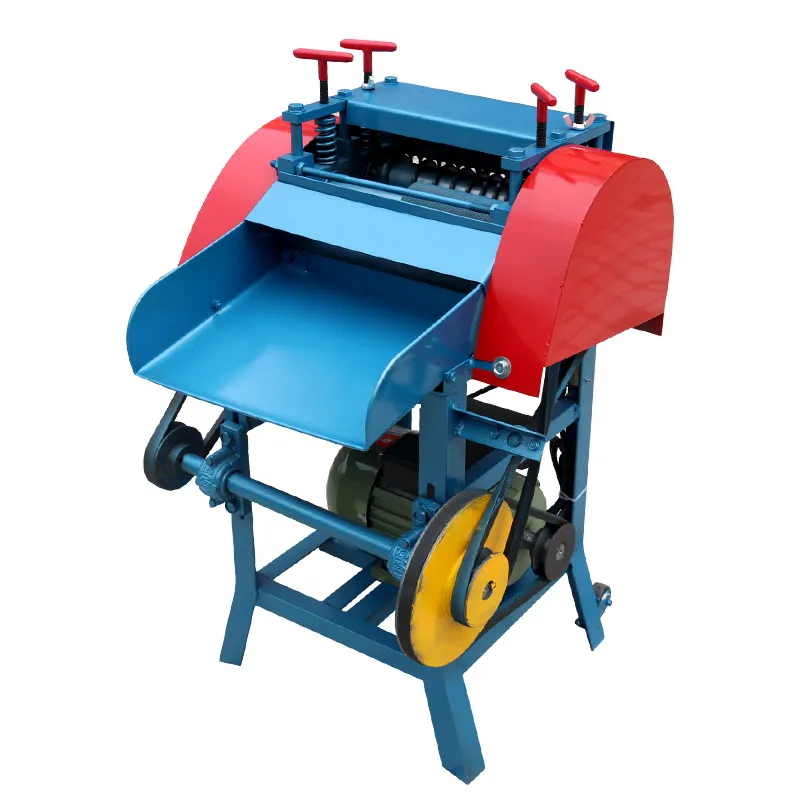

ኅዳር . 08, 2024 04:18 Back to list
The Importance of Shredding Machines for Metal Recycling
In the modern age of industrialization and environmental awareness, the need for effective waste management has become paramount. Among various waste materials, metals pose significant challenges due to their longevity and toxicity in landfills. Shredding machines for metal have emerged as critical tools in the recycling process, playing a vital role in minimizing waste and promoting the sustainable use of resources.
Understanding Shredding Machines
Shredding machines are industrial devices designed to reduce large, bulky materials into smaller, manageable pieces. In the context of metal recycling, these machines are used to process a variety of metals, including ferrous (iron and steel) and non-ferrous metals (aluminum, copper, etc.). The shredding process involves the application of high-pressure mechanisms and cutting blades that effectively tear apart metals, rendering them suitable for further processing and recycling.
How Metal Shredding Works
The shredding process begins with the collection of scrap metal from various sources such as construction sites, manufacturing facilities, and household waste. Once collected, these metals are fed into the shredding machine. The machine employs powerful motors and rotating blades that generate intense forces capable of breaking down the metals into smaller fragments. This not only makes transportation easier but also allows for efficient sorting and processing afterward.
After shredding, the metal pieces undergo further separation processes, including magnetization for ferrous metals and air classification for non-ferrous metals, allowing recyclers to obtain clean, sorted metals. The shredded material can then be melted down and repurposed for manufacturing new products, thereby closing the recycling loop.
Benefits of Using Metal Shredding Machines

1. Environmental Impact One of the most significant benefits of shredding machines for metal recycling is their contribution to environmental sustainability. Recycling metals reduces the need for mining new materials, which can lead to habitat destruction, pollution, and high energy consumption. By recycling, we significantly lower our carbon footprint.
2. Resource Conservation Metals are finite resources, and their extraction is increasingly costly and environmentally damaging. Shredding machines enable the recovery of valuable metals from waste, allowing manufacturers to conserve resources and decrease reliance on virgin materials.
3. Economic Advantages The recycling industry is a vital component of a circular economy. By investing in shredding technology, businesses can reduce waste management costs, generate revenue from recycled materials, and create jobs in the recycling sector. Shredded metals can be sold to manufacturers at competitive prices, making the recycling process economically viable.
4. Safety and Compliance Scrap metal can pose various hazards, including sharp edges and hazardous materials. Shredding machines reduce these risks by processing waste metal into smaller, uniform pieces, which are safer to handle and transport. Moreover, proper recycling practices ensure compliance with environmental regulations, helping businesses avoid fines and legal issues.
Technological Advancements
Advancements in technology have led to the development of more efficient and sophisticated shredding machines. Modern machines come equipped with features like programmable controls, enhanced safety mechanisms, and energy-efficient motors. These improvements not only increase productivity but also reduce operational costs, making metal shredding an even more attractive option for businesses.
Conclusion
Shredding machines for metal are indispensable tools in today’s recycling landscape. Their ability to convert waste metals into valuable resources contributes significantly to environmental conservation, economic stability, and public safety. As the world continues to grapple with the challenges of waste management and resource depletion, the role of shredding machines remains crucial. Investing in this technology not only benefits individual businesses but also supports broader initiatives aimed at fostering a sustainable future for generations to come. Embracing metal shredding is not just an industrial choice; it is a step towards a greener planet.
Latest news
Troubleshooting Common Eddy Separator Problems
NewsJul.04,2025
The Role of Metal Recycling Plants in Circular Economy
NewsJul.04,2025
The Impact of Recycling Line Pickers on Waste Management Costs
NewsJul.04,2025
Safety Features Every Metal Shredder Should Have
NewsJul.04,2025
How Industrial Shredders Improve Waste Management Systems
NewsJul.04,2025
How Cable Granulators Contribute to Sustainable Recycling
NewsJul.04,2025